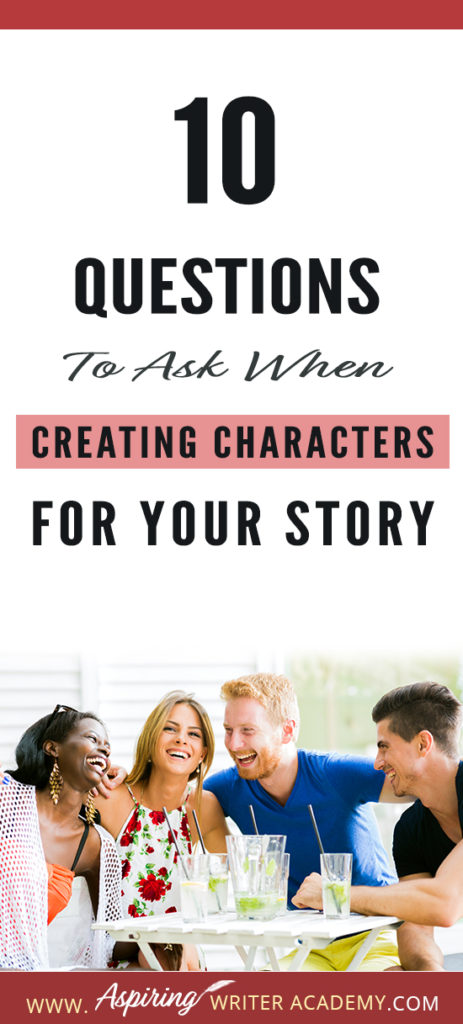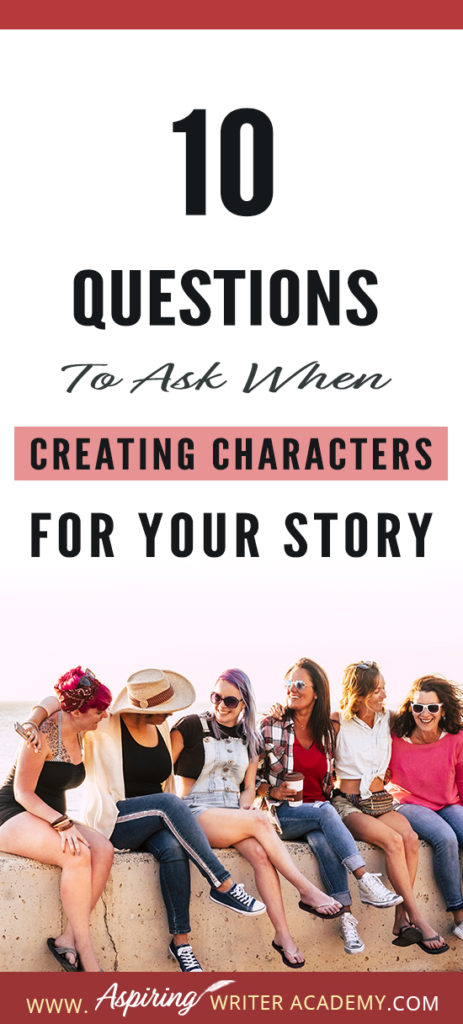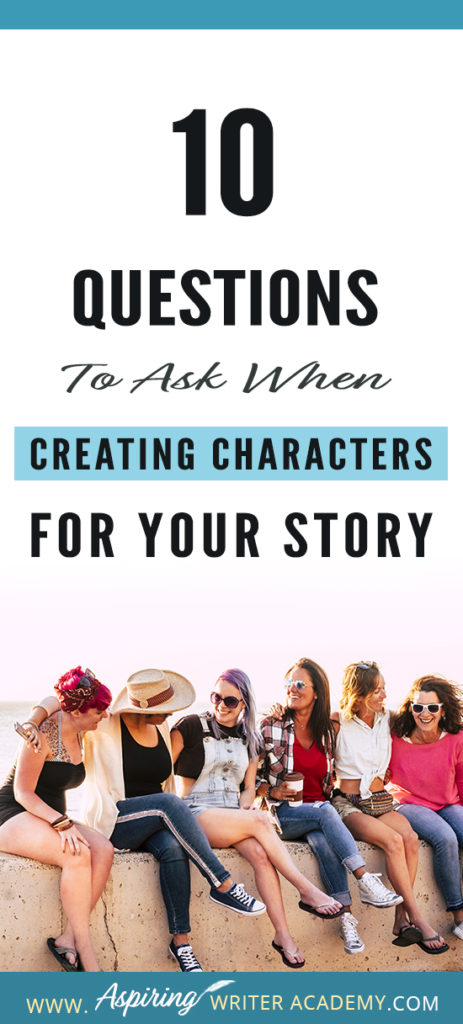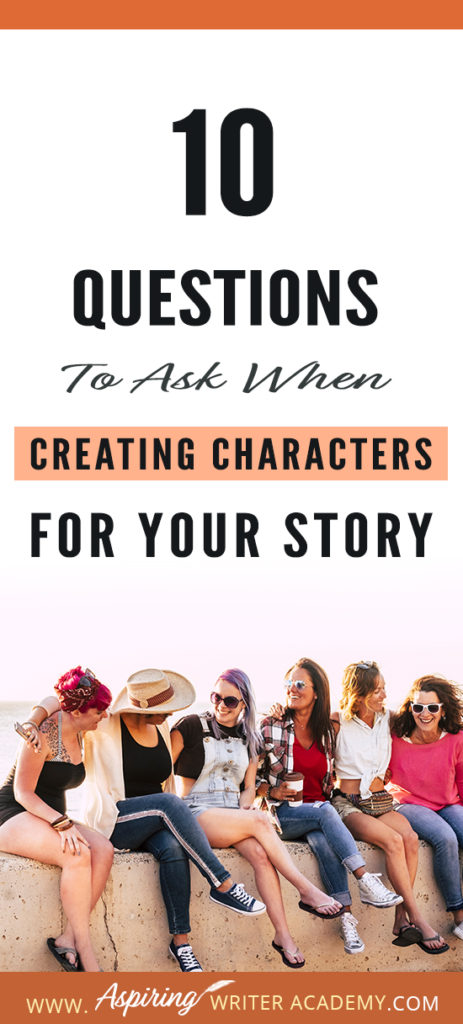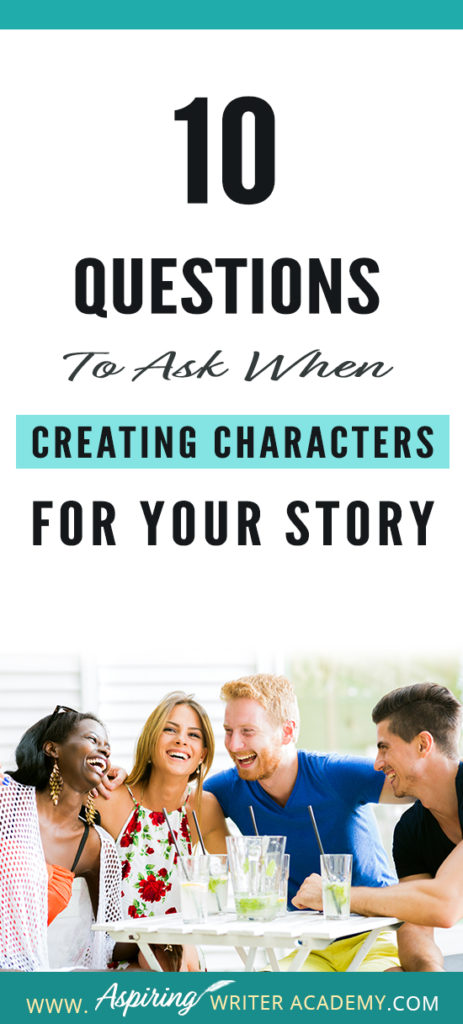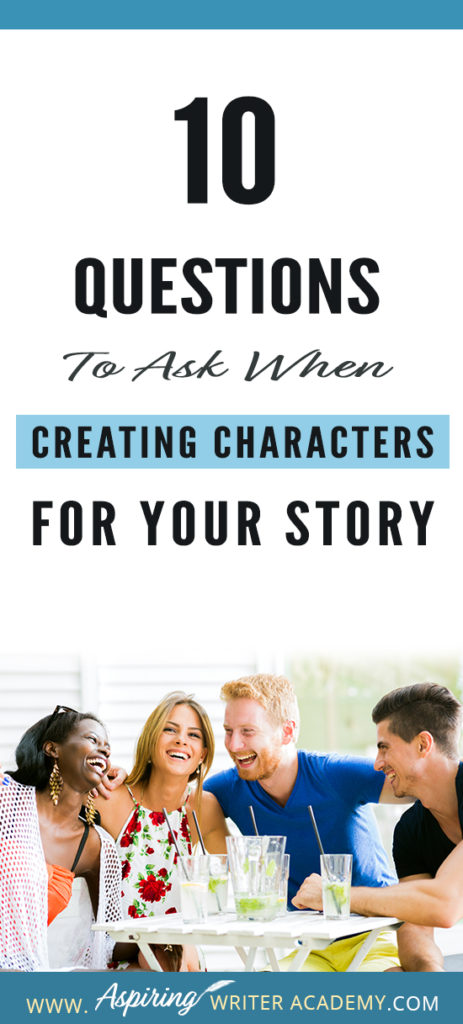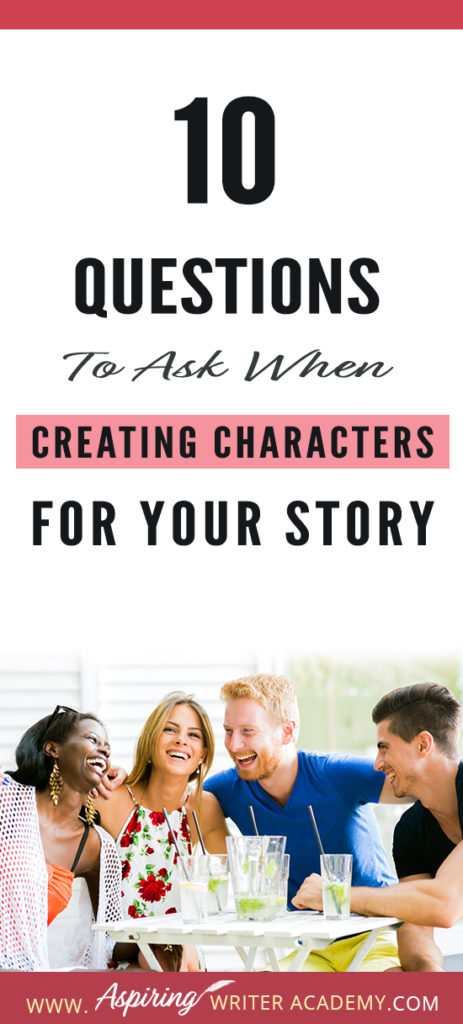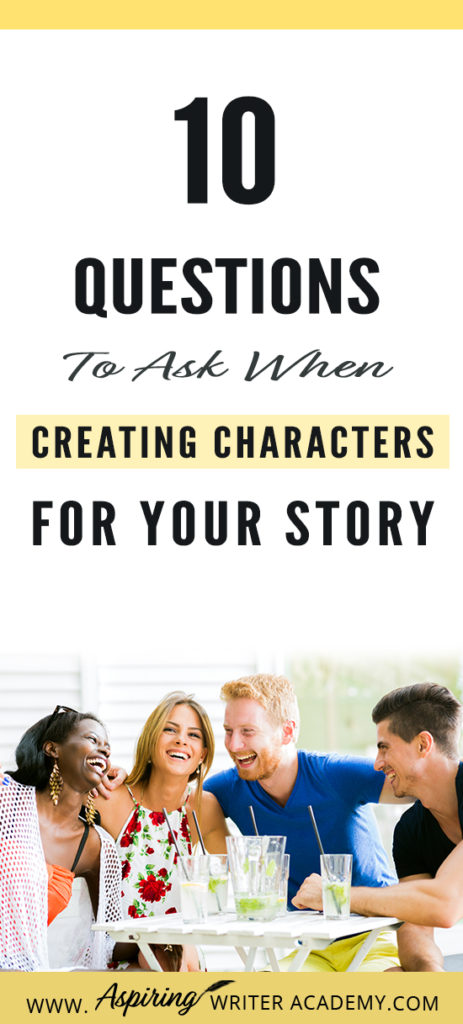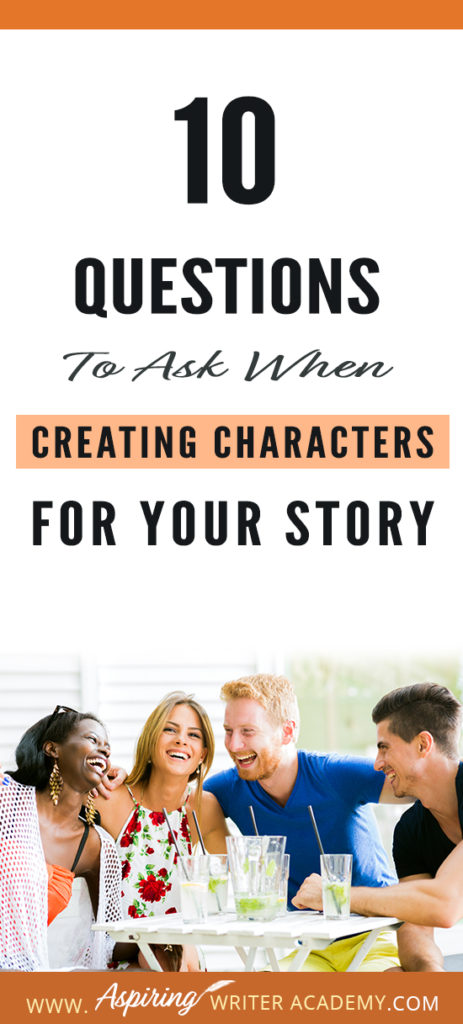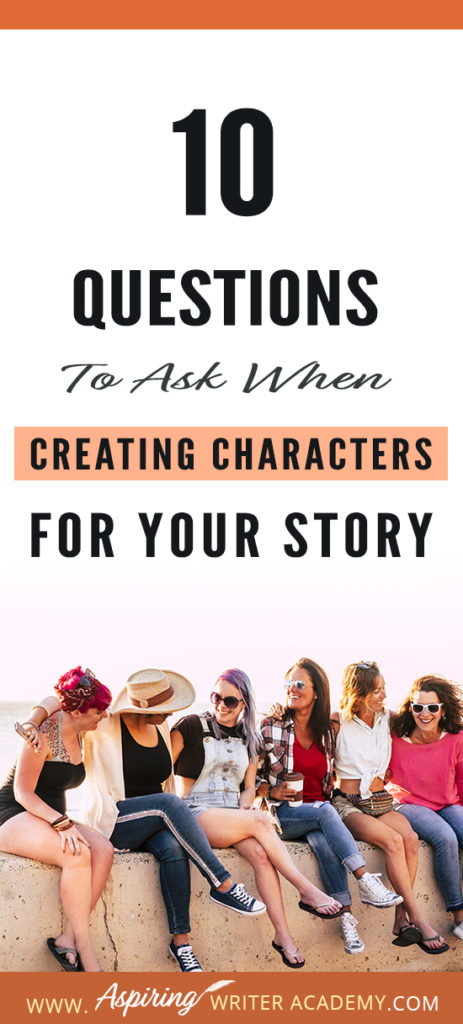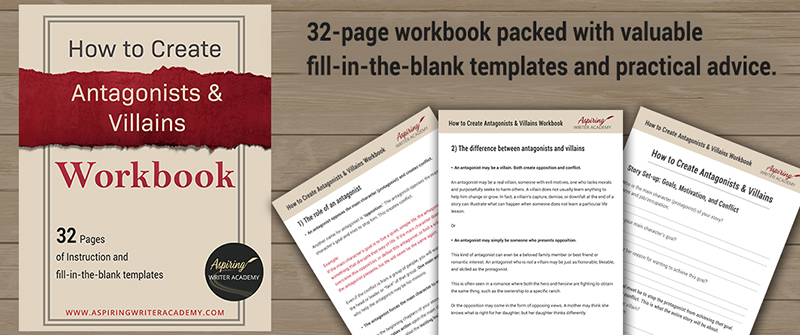10 Questions to Ask When Creating Characters for Your Story

You have decided that you want to delve into the world of fiction and write a story. Great! You even have an awesome story idea that you’ve been playing around with in your head. Great! Now…what kind of characters could be in a story like this? And most importantly, who will be the protagonist—the main character of your story?
Below, I’ve listed 10 Questions to Ask When Creating Characters for Your Story. The answers that you come up with will give your cast of characters clarity, purpose, and depth. Having a character sketch in place while brainstorming and writing your first draft can make the writing process so much easier. And while you may need to revise or tweak some of the details as you go, you will find that these questions will give you the tools you need to start creating meaningful characters to populate your story.

1) What is this character’s purpose?
If your character has no purpose for being in the story, then most likely they should be cut. Each character should have a reason for being included, even if it is just to provide motivation for your main character.
- The main character, the protagonist, should be the one who has the most to lose if he fails, and is the one who takes action to drive the story forward. The story is centered upon the decisions this character makes to pursue and achieve his goals.
- An antagonist’s purpose is to oppose the main character and try to stop him from achieving his goals.
- A mentor may be included to instruct or guide the main character as he pursues his goal, offering wisdom or advice to help the main character succeed or grow.
- The purpose of a sidekick or best friend may be to act as a ‘window character’ that the main character can talk to so the reader can gain insight into his thought process and decision making. The sidekick or friend can also assist the main character as he pursues his goal.
- A romantic interest may help the main character learn to love or develop new relationships or further his emotional development. A romantic interest can also help the main character defeat the opposition much like the sidekick or friend.
- A sick parent or sibling may serve as motivation for why the main character cannot leave home or why he must take on a second job.

2) What is this character’s goal?
The character’s purpose for being in the story may be very different than their own personal goal. The author may include a secondary character with an addiction to alcohol in the story to provide motivation for why the main character needs to stay in town (which is to take care of her), while the secondary character’s goal might be to either drown out her sorrows with more booze or attempt to overcome the addiction with the main character’s help.
The main character will have their own personal desires/dreams/life goals but early in the story something unexpected should happen that creates a major problem the character must resolve. The unexpected problem will force him/her to form a story goal—an action plan—on how to deal it. The reader keeps turning pages to see whether the character finally achieves their story goal of resolving the unexpected story problem or not.
How might this story goal to solve the unexpected problem conflict with their personal desires/dreams/life goals? Will the character have to choose between them? Will pursuing the story goal put their personal goals further out of reach?
3) What is this character’s motivation?
Why is it so important the character pursues this goal? What are the stakes?
The consequences of failure for the main character should make achieving his story goal critical. His life will never be the same or “good” either physically or emotionally or both unless he overcomes the opposition and achieves his story-worthy goal. Who or what is prompting him to do whatever it takes to succeed? What happens if he fails?
The antagonist’s goal to oppose the main character should be just as strong. Why is it critical he thwart the main character’s plans? What does he have to lose if he fails and gain if he wins? How far will his desire to defeat the main character push him?
The other characters in your story should also have their own goals that they are passionate to achieve, even if they do not get as much page time as the protagonist and antagonist in the story.
Example: The main character’s poor neighbor, desperate for food, may snitch on him—if the antagonist offers money—because the neighbor’s primary goal is to buy food for his family.
So, while brainstorming characters you must ask: what drives them to do what they do?
To ramp up the tension in the story, the sub-characters fate may rest upon or be tied in with the main character’s triumph or defeat. This raises the stakes for the main character because he knows he has other people depending on him to achieve his goal.
Example: The new sheriff must track down the thief stealing money from the local businesses before everyone in town is bankrupt.
4) Who is the opposition?
Who opposes your main character’s goal to solve the unexpected story problem?
While nature may blow down a tree across the road to prevent the main character from attending an important meeting, there should be an active opponent consciously and actively striving to keep the main character from achieving his goal throughout the story.
The opposition should be just as strong or stronger than the main character in some way. Maybe physically or intellectually. Perhaps the antagonist simply has more money, which buys him loyalty and influence. Whatever his strength, he should be a worthy foe.
Sometimes the antagonist is a true villain or crook, someone out to maliciously harm others. Sometimes the antagonist is a family member or neighbor or business partner who simply disagrees and has an opposing view. Or perhaps two friends may be vying for the same job. Two brothers may fight on the opposite side of a civil war. And sometimes the antagonist can be an animal or monster terrorizing a village.
It is also important to give the opposition a “face.” If the opposing force in your story is a government or corporation or group, there should be someone from that group that has a name and a face, a description. A bodily figure who represents that group. Someone the main character (and the reader) can identify specifically as being a threat.
In addition to the main character having an antagonist, some of your sub-characters may have their own antagonists. How might this affect the story? How might two opposing sub-characters at war with each other affect the main character’s goal? How might other characters and their opposition interfere with the main character in his attempt to overcome his own opposition? These questions can bring forth some interesting sub-plots.

5) Who is this character’s friend, or mentor, or partner? Who do they talk to or work with?
Most people do not live in isolation and neither should your characters. Who populates the main character’s world? Who are his family, neighbors, business partners? Who does he/she interact with on a daily basis? If he is stranded on a deserted island, who does he talk to? A volleyball? A coconut? A monkey? An imaginary friend?
Decide which characters may be needed for your story and how they might each interact with the main character and/or antagonist. Whose side are they on? Are they for or against the main character? How do they help or hinder him? (Remember, they must serve some purpose in the story.)
Beware of including too many characters in the story. Can you have one sub-character fulfill two roles? Can the bakery chef also be the town historian in his spare time? Limit your cast to only those whose roles are necessary and have a direct bearing on the plot.
6) What is this character’s personality type? How will that conflict or align with his story purpose?
You may want to start with a basic stereotype or archetype but then you should brainstorm how you can make this character different. By making your characters different, you will end up making your story different (and much more interesting) for your readers. After all, readers like to be surprised.
For example, if you have a dog in your story who can talk, or a vampire who does not like to suck blood, or a prominent high school jock who is terrified of spiders or who can’t ever get a date with the cute girl…those are things that are not expected.
Characters who are different than most break the stereotypical ‘mold’ in the readers mind, perk up interest, and entice the reader to keep reading.
And if the character’s personality type causes internal strife and wreaks havoc with their purpose for being in the story, then that is even better. Life for your characters should never be easy. The reader wants to see how they handle challenges and come out better for it…or not.
Your character should also have several aspects to his personality, not just one. So even if one of your character’s personality traits make him appear well suited for his purpose, like a firefighter who seems to have been born courageous, also give this character something else in their personality that the reader would not expect. Something that complicates things for him.
Example: Maybe the courageous firefighter is the first to burst through the door of a house on fire, but he is also suffering from indecision and once inside, he has trouble deciphering if he was supposed to go left or right. The wrong choice could get him—and others—in trouble.

7) What does this character look like?
Figuring out your character’s purpose and personality is much more important than their physical description, but at some point, you will have to decide upon their appearance.
You can start with their basic body type, height, weight, hair and eye color. Is their hair long or short? How is it styled? Are they bald? Do they have a mustache or beard? Do they wear makeup? Or walk with a limp? Do they have any distinguishing scars or birthmarks?
While considering these questions, you might also ponder how they received that scar or why they dyed their blonde hair black. This could give us more insight into their personality type. Does the way they look have any bearing on the plot? Does it help or hinder their purpose for being in the story?
Stories are all about conflict several layers deep. How could your character’s appearance cause him more conflict? Does this character’s looks complement their personality or conflict with who he/she really is inside?
8) What are this character’s strengths?
What is this character good at? What are his talents, abilities, or natural strengths? What is his ‘Superpower?’
Can your character whistle? Climb tall trees? Knit? Sew? Bake? Cook? Dance? Play baseball? Build houses? Fix cars? Can your character influence or manipulate others? Is he naturally intuitive? Is your character a whiz at math or a brilliant writer?
How can these strengths help the character as he pursues his goal? How might they also trip him up and cause him trouble?
A character may be very good at calculating numbers, but if it leads him to figure out who is embezzling money from his company and the embezzler discovers he knows, it could put that character’s life in danger.
A character may have a beautiful singing voice and is chosen to sing a solo on stage at the upcoming fair, but her voice is so beautiful—and recognizable—that the hit man who has been contracted to kill her may just have to follow the music to find his next target.

9) What are this character’s weaknesses?
What is your character not good at? What could hinder his pursuit of his goal, cause him trouble, or cause him to fail? What must he learn to do before he can defeat the opposition and achieve his goal?
Example: Perhaps the heroine has never handled a weapon and needs to overcome her fear of guns and learn to shoot a pistol and hit the target.
What fears may hold your character back? Something in the character’s past may have happened that continues to haunt him and cause him trouble even years later.
Example: Perhaps the hero failed to keep his young brother safe from harm when they were young and he carries guilt from the incident and doesn’t trust himself to keep the heroine safe from the villain in the present.
Or the woman who was mocked by her teacher when young for wanting to lead is afraid to run for office for fear she isn't good enough, even though she is over-qualified.
Perhaps the character was bit by a dog when young and has been fearful of dogs ever since. When put in a situation involving a canine unit, the character freezes up and as a result, the antagonist gets away and others are put in danger.

10) What is the intended character arc or lesson to learn?
What will your main character be able to do at the end of the story that they couldn’t do at the beginning? What will your character learn by going on this ‘journey’ to solve the unexpected story problem? How will they change? What weakness did they have to learn to overcome over the course of story to finally defeat the villain and achieve their goal? Was the adventure all for nothing? Or will your character come out a better person? What have your sub-characters learned?
Satisfying stories contain transformational arcs that begin with a character in need. Perhaps they have a wound that needs healing, or a viewpoint that needs shifting, or they need to grow in a certain area or expertise. During the course of the story the events of the plot should help the character recognize, face, and work to fulfill this need so that at the end of the story the character can come out in a better place than where they started. The events of the plot help create character change.
For example:
After her divorce, Mary had trouble opening her heart to another, but after working with a handsome co-worker to expose the espionage ring at the local factory, she learned to love again.
Another example:
Dan went from being selfish to generous after an unexpected group of volunteers helped rebuild his house after the devastating hurricane and opened his eyes to the value of friendship and community.
One more:
Sally was without a doubt the worst cook on the planet, but after taking a series of culinary classes with a patient, unfettered chef, her dish won first place in the regional chili cook-off competition.
To develop a character arc, ask: Who was this character in the beginning? What were his hang ups? What was he lacking? And who is this character in the end? How has the story helped him grow as a person?
Think of it this way:
Character A went from _________________ to _________________.
Unloving to loving.
Stingy to generous.
Conceited to humble.
Beginner to expert.
Uneducated to knowledgeable.
What did the events of the plot help them to learn?
Final Wrap-up:
I hope you find these 10 Questions to Ask When Creating Characters for Your Story
helpful as you brainstorm ideas for your story. As an extra bonus, I invite you to download our free Brainstorming Your Story Idea Worksheet which gives you an easy-to-fill-in template to create fictional characters and develop your plot. And if you have any questions, you can always reach us at https://www.aspiringwriteracademy.com/contact/
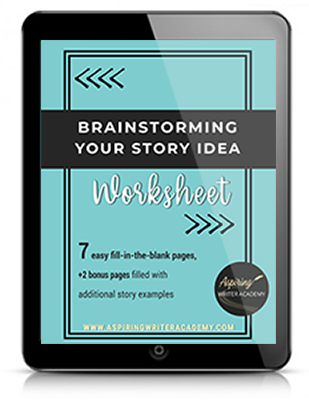
ENTER YOUR EMAIL BELOW
TO GET YOUR FREE
"Brainstorming Your Story Idea Worksheet"
7 easy fill-in-the-blank pages,
+ 2 bonus pages filled with additional story examples.
A valuable tool to develop story plots again and again.
Our Goal for Aspiring Writer Academy is to help people learn how to write quality fiction, teach them to publish and promote their work, and to give them the necessary tools to pursue a writing career.
If you have any questions or would like to leave a comment below, we would love to hear from you!
Other Blog Posts You May Like
Basic Story Structure: How to Plot in 6 Steps
Behind the Scenes: Interview with the Authors of the “Sew in Love” Collection
Our Inspiration For Writing A Historical Novella Collection
Brainstorming Story Ideas: Where to Find Them
Why We Started Aspiring Writer Academy: Our Story
Scene & Sequel: The Secret to Plotting an Epic Novel
Scene & Sequel: The Secret to Plotting an Epic Novel (Part 2)
Writing Fiction: How to Develop Your Story Premise
12 Quick Tips to Write Dazzling Dialogue
10 Questions to Ask When Creating Characters for Your Story
Macro Edits: Looking at Your Story as a Whole
Do you find it difficult to create compelling antagonists and villains for your stories? Do your villains feel cartoonish and unbelievable? Do they lack motivation or a specific game plan? Discover the secrets to crafting villains that will stick with your readers long after they finish your story, with our How to Create Antagonists & Villains Workbook.
This 32-page instructional workbook is packed with valuable fill-in-the-blank templates and practical advice to help you create memorable and effective antagonists and villains. Whether you're a seasoned writer or just starting out, this workbook will take your writing to the next level.

is a multi-published author, speaker, and writing coach. She writes sweet contemporary, inspirational, and historical romance and loves teaching aspiring writers how to write quality fiction. Read her inspiring story of how she published her first book and launched a successful writing career.

